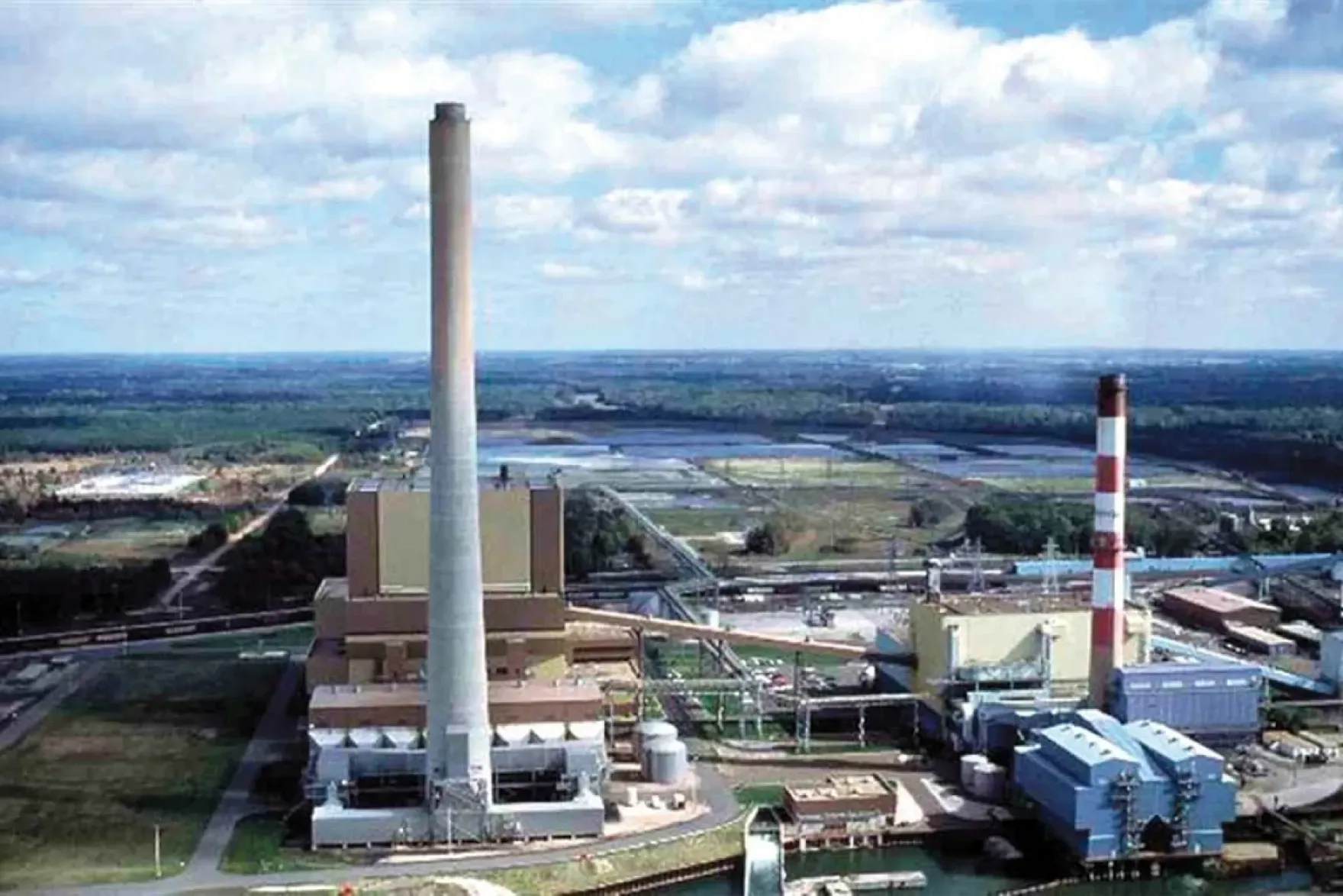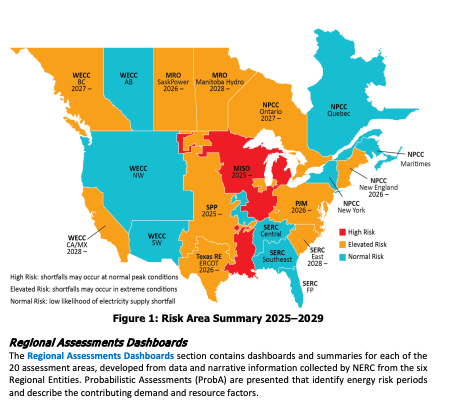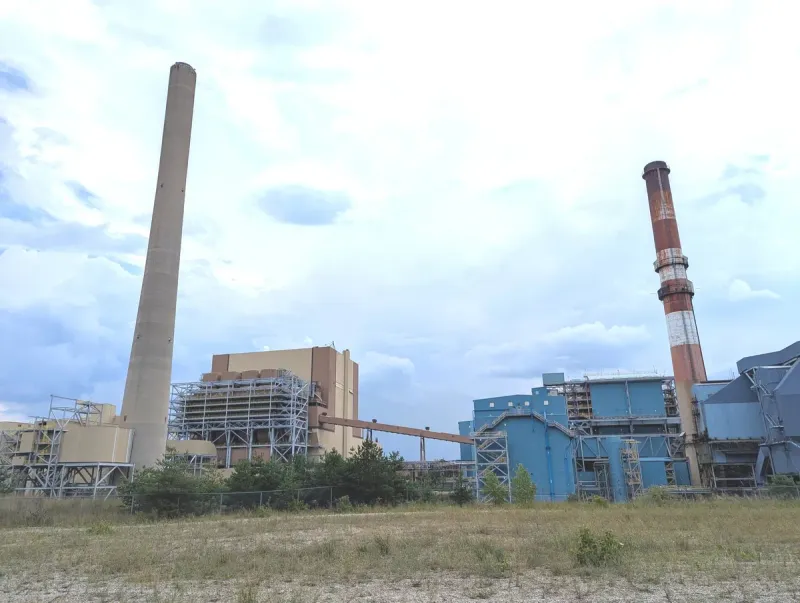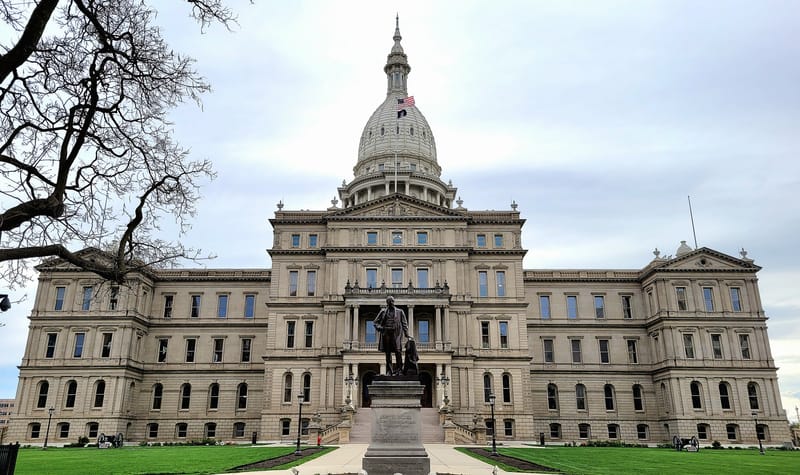Campbell coal plant's closure delayed 90 days with Energy Secretary's emergency order
U.S. Secretary of Energy Chris Wright issued the emergency order on Friday, May 23 — just eight days before the plant was scheduled to shut down, a plan that has been in place since 2021.

Story summary
- U.S. Department of Energy Secretary Chris Wright issued an emergency order on Friday, May 23 — just eight days before the J.H. Campbell plant in Port Sheldon Township was scheduled to shut down, a plan that has been in place since 2021.
- The Ottawa County Board of Commissioners approved a resolution on in February urging Consumers Energy to delay the closure of the J.H. Campbell plant, however, it stopped short of filing a lawsuit in April.
- Consumers Energy previously said the plan for closure was vetted and approved from multiple stakeholders and regulatory agencies; it is unknown how much coal remains at the site to continue operations.
PORT SHELDON TWP. — The long-planned closing of the coal-fired J.H. Campbell plant in Port Sheldon Township will be delayed at least 90 days after Trump Administration officials issued an emergency order directing Consumers Energy to remain “available for operation” going into peak summer demand.
U.S. Secretary of Energy Chris Wright issued the emergency order on Friday, May 23 — just eight days before the plant was scheduled to shut down, a plan that has been in place since 2021.
The U.S. Department of Energy said the move is intended “to minimize the risk of blackouts and address critical grid security issues in the Midwestern region of the United States ahead of the high electricity demand expected this summer.”
Wright directed the Midcontinent Independent System Operator, or MISO, in coordination with Consumers Energy to ensure that the 1,560 megawatt plant to “[remain] available for operation, minimizing any potential capacity shortfall that could lead to unnecessary power outages.”
“Today’s emergency order ensures that Michiganders and the greater Midwest region do not lose critical power generation capability as summer begins and electricity demand regularly reach high levels,” Wright said in a prepared news release.
The Energy Department said the emergency order, which is issued by the Office of Cybersecurity, Energy Security, and Emergency Response, is authorized by Section 202(c) of the Federal Power Act and is in accordance with President Trump’s Executive Order: Declaring a National Energy Emergency to ensure that power generation availability in the region does not “dip below 2024 capacity levels.”
“This administration will not sit back and allow dangerous energy subtraction policies threaten the resiliency of our grid and raise electricity prices on American families. With President Trump’s leadership, the Energy Department is hard at work securing the American people access to affordable, reliable, and secure energy that powers their lives regardless of whether the wind is blowing, or the sun is shining.”
On May 14, Consumers officials said the planned May 31 closure of the Campbell plant remained on track. After Wright issued the emergency order on Friday, however, the company said it would comply.
“Consumers Energy plans to comply with the 90-day pause from the Department of Energy. We are reviewing the executive action and the overall impact on our company,” Katie Carey, director of media relations for Consumers, said in a Friday statement to ONN.
A long-debated topic
The emergency order came after a yearlong effort from a local grassroots organization petitioned Ottawa County officials to intervene in some way to prevent the closure of the Campbell plant.
Read More: County poised to urge delay in closing Campbell as officials say plan likely won't change
Organizers of the "Save the Campbell" effort coalesced at the beginning of 2024 — mainly members of far-right fundamentalist groups such as Ottawa Impact, The Gideon 300 and the Ottawa County GOP — said a government-owned electric co-op was possible if voters approved a "home rule charter" at the ballot box.
The issue was never put up for a vote, so a change in government structure is not forthcoming; however, local officials asked Consumers for reassurance earlier this year that local energy supplies will be uninterrupted as the Campbell plant headed for closure at the end of May.
In February, the Ottawa County Board of Commissioners approved a resolution urging delay in the plant’s closure, however, officials stopped short April 22 of opting to bring litigation to prevent the closure altogether.
Commissioners pointed to two separate reports — from MISO as well as the North American Electric Reliability Corporation, or NERC — that gave them concerns over the energy grid’s reliability once the Campbell is taken offline.
MISO published the results of its annual survey in June 2024, which indicated at the time that there was “a growing capacity deficit beginning in the 2025-26 planning year.”
“Next summer, MISO could see resource sufficiency ranging from a 2.7 GW capacity shortfall to a 1.1 GW surplus, underscoring the need to accelerate resource additions, monitor large load additions, and delay resource retirements to reliably manage the anticipated growth in electricity demand,” according to the survey.
NERC is a nonprofit international regulatory authority that more broadly looks at reliability standards as well as seasonal and long‐term outlooks for the entire U.S. grid. The group published a long-term reliability assessment in December 2024 that labeled MISO’s section of the grid as “high risk,” meaning the grid subsection that includes the state of Michigan “falls below established resource adequacy criteria in the next five years.”
“High-risk areas are likely to experience a shortfall in electricity supplies at the peak of an average summer or winter season. Extreme weather, producing wide-area heat waves or deep-freeze events, poses an even greater threat to reliability,” the report said.

Commissioner Jacob Bonnema questioned why Consumers opted to sunset the plant five years ahead than previously planned.
Dena Isabell, stakeholder engagement manager at Consumers, told commissioners in February that Consumers adopted in 2021 that helped the company identify about $600 million in savings for its customers over 20 years with the retirement of the plant.
“That includes renewables that get brought onto the grid, which are cheaper than what we have,” she said, “so that is a savings to our customers, which is part of the clean and affordable and reliable energy — so it's an economic decision.”
One component of the cost savings was coal.
Rich Houtteman, community affairs manager for Consumers, explained to commissioners in February that the cost of shipping coal is a huge financial consideration for the energy company.
“It's about $50 a ton to ship excess coal off-site,” he said. “We had 30,000 tons. That's a lot for our customers. So we're trying to burn up all the coal as we kind of bring in 130 train car loads a day.”
Consumers did not respond to an inquiry Friday evening on how much coal remained on the site.
A political talking point
OI Commissioner Allison Miedema — who strongly backed the county suing Consumers to prevent the Campbell closure — asked the utility company’s officials in February what new assets were being brought onto the grid.
Isabell pointed to renewables as well as natural gas assets.
“We do have a lot of renewables that are coming online, so that is very important to us,” she said. “We do have natural gas. We like natural gas. It is part of our future that we have — it is agile, it's able to come online quickly, we can dispatch that in a matter of hours, versus a matter of days in the cold — so we see natural gas as part of our future.”
Isabell also noted wind and solar and battery storage, “which is going to be a major, major component and required by law, so we are going to be adding a ton of battery storage as well.”
After Isabell noted that the state’s new clean energy laws required energy companies to have clean and sustainable energy sources by 2040, OI Commissioner Sylvia Rhodea asked if the new Trump Administration’s policies could lead to a relaxation in Consumers’ plans.
“Is it possible we might see a change in that legislation that would lift those requirements? I'm just wondering if it could be slowed down if we're not looking at deadlines until 2040,” Rhodea said.
Isabell said Consumers was committed to its clean energy plan in 2021 — before the legislation in Michigan was approved in 2023 — and that bringing massive assets like the Campbell on and off the grid is no simple or quick task.
“We do our best to try to be as agile as possible, but assets like this aren't something that you can just bring on and take off very quickly,” she said. “So we do our best in these integrated resources plans to try to plan for what we think could be possible in the future. But we can't plan for everything that could happen with any type of policy. So our plan to retire (Campbell) was on the last integrated resource plan, which does actually meet the new state policy, which works for us going forward.
“But large assets like that aren't something that you can just quickly change with new policies in two years.”
The integrated resource plans are required by the Michigan Public Service Commission, a regulatory agency that oversees public utilities in Michigan.
“The Michigan Public Service Commission requires us to create a 20-year plan that says, ‘How are you going to serve your customer, clean, reliable and affordable energy for the next 20 years?’ And this requires us to come up with scenarios,” Isabell said.
Those scenarios are then presented to stakeholders in a series of workshops over two years with community stakeholders who then provide feedback to help.
“We're retooling, and we're getting ready to do our next integrated resource plan, new technologies, new laws, new things like that require us to be agile. We constantly need to update those plans and make sure that we're giving our customers the best technology and the best cost we possibly can,” Isabell said.
How we got here
The Campbell Plant is Consumers' last — and largest — coal-fired plant in the state.
The plant, operating since 1962, was originally scheduled to close partially in 2030 and wholly in 2040. But the utility announced in 2021 it was moving the plan up by 15 years for an operations end date of May 31, 2025.
Read More: Consumers Energy reaches agreement to close Campbell plant, end utility's coal use by 2025
The utility was seeking to end coal use altogether by 2025 as part of its goal to achieve carbon neutrality.
Since the announcement, Consumers has been actively preparing the plant for "full retirement," a spokesperson said last year.
"The complex will officially go into retirement with an aim to go cold and dark after 2025," said former Consumers spokesperson Kristen Van Kley. "In 2026 and on, the complex will be demolished with a plan to restore the site over time."
The plant, when operating at full capacity, can generate 1,450 megawatts of electricity. Michigan consumed about 113,740 gigawatt hours of electricity in 2019, according to a 2020 report from the U.S. Department of Energy.
At the time, Van Kley said new technologies would ensure Consumers would be able to continue supporting the statewide grid.
"Energy efficiency, demand response and emerging technologies such as grid modernization and battery storage will help us lower peak customer demand for electricity and deliver exactly what Michigan needs," she said. "Our plan is designed to respond to emerging needs, adapt to changing conditions and embrace emerging innovative technologies as we work to achieve net zero carbon emissions."
Support Our Work
Ottawa News Network is a nonprofit news service dedicated to providing the residents of Ottawa County with trustworthy, community-driven news. ONN treats journalism as a public good — something that enriches lives and empowers Ottawa County’s 300,000-plus residents to stay engaged, make informed decisions, and strengthen local democracy. Please consider giving today.
Key to that strategy are natural gas-fired plants in Consumers' portfolio, Van Kley said, which include locations in Zeeland, Jackson and a 1,200-megawatt facility that began operating in Van Buren County's Covert Township in June 2023.
Those operations "will supply reliable, on-demand electricity to meet Michigan’s energy needs when renewables and other sources are not available," Van Kley said.
Meanwhile, efforts continue to restart operations at Palisades Nuclear Power Plant in Covert Township. The facility, owned by New Jersey-based Holtec International, went offline for decommissioning in May 2022.
— Sarah Leach is the executive editor of the Ottawa News Network. Contact her at sleach@ottawanewsnetwork.org. Follow her on Twitter @ONNLeach.





